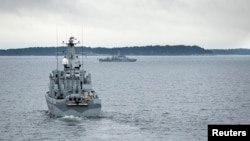Fears of Russia re-asserting its Cold War dominance in the Baltic Sea are forcing countries there to re-think their defenses, prioritizing military spending at home and reducing participation in far-flung U.N. or U.S.-led missions.
Sweden's fruitless search for a submarine - dubbed by locals “The Hunt for Reds in October” - and Russian violations of airspace are seen as elements of what one defense minister called a "hybrid warfare," where fear and propaganda are deployed to keep countries on their toes.
“It is a new normal,” Anna Wieslander, deputy director of the Swedish Institute of International Affairs, said of Russia's greater military activity. “The readiness to respond to suspected territorial violations needs to be increased.”
Most countries on Russia's northwestern flank are planning higher military spending, reversing sharp falls of recent years, after the crisis in Ukraine revived Cold War tensions and exposed aging equipment.
The Baltic states, for instance, have just one working tank - a 1955 Soviet-era T-55 in Riga. Sweden's week-long search for a submarine was hampered by the sale or retirement of anti-submarine helicopters in 2008.
In the Cold War, Nordic nations were on a front line facing the Soviet Union across the Baltic. But the “peace dividend” reaped since then has meant less military spending. Sweden's defense budget, for example, shrank from 3 percent of gross domestic product in 1980 to 1.2 percent last year.
“Russia sees that ... this is a Monty Python type of defense,” said Jonathan Eyal, international director of the Royal United Services Institute think-tank in London.
Estonia has reported six breaches of airspace by Russian aircraft this year, up from two in all of 2013. Latvia says it has sighted more than 40 Russian military vessels near its waters this year, usually a rarity.
“Defensive tasks closer to home must take a higher priority if Russian adventurism is to be deterred,” said Keir Giles, a military expert at the Chatham House think-tank in Britain.
Turning inwards
Shoring up domestic defenses is leaving fewer resources for foreign missions.
Norwegian Prime Minister Erna Solberg said Oslo would not match Denmark in sending F-16 fighter planes to help the United States fight Islamic State militants in Iraq.
“My impression is that all our NATO friends believe our key role now is actually to ensure good surveillance in the north,” Solberg told Norway's TV2 this month.
Swedish Foreign Minister Margot Wallstrom said her new center-left government would be less enthusiastic about working with NATO. Sweden and Finland are outside NATO while Denmark, Norway, Iceland, Lithuania, Latvia and Estonia are members.
“I think we have to do both,” Wallstrom told reporters on Friday of local and foreign priorities.
“I am interested in using Sweden's good name in contributing to U.N. troops and U.N. missions” such as in Mali, she said, but stressed: “Of course we don't have unlimited resources.”
In 2010, Lithuanian President Dalia Grybauskaite rejected higher military spending, arguing that pensions and wages were a priority. She changed her tune after Russia's annexation of the Black Sea peninsula of Crimea from Ukraine in March and Russian exercises off the Baltic enclave of Kaliningrad.
“Life always gives many corrections, including to political decisions,” she said.
Putin tests NATO
Russian President Vladimir Putin may see the small Nordic and Baltic nations as a testing ground for the unity of the U.S.-led NATO alliance - NATO members are obliged to treat an attack on any member as an attack on all.
The Baltic states, which regained independence from Moscow in 1991, are acutely aware of vulnerability. Like Ukraine, they rely on Russian energy and have sizeable Russian minorities.
Lithuania hopes to meet an informal NATO goal of 2 percent of GDP on defense in 2017, up from 0.9 percent in 2014. Latvia aims to met the goal by 2020, also up from 0.9 pct in 2014.
Estonia, the only Nordic or Baltic nation to meet the NATO goal, plans to raise spending fractionally to 2.05 percent of GDP in 2015.
Finland is considering raising defense spending, projected at 1.3 percent of GDP in 2015.
“We have squeezed every possible thing out and in the long term, that will not be enough to sustain a credible defense,” Finnish Defense Minister Carl Haglund said at the weekend.
Some say the Russian threat should not be exaggerated.
“I cannot imagine that Russia would dare to disturb the Baltic countries or Poland or any NATO member,” Danish Foreign Minister Martin Lindegaard told Reuters, saying Moscow was waging a 'hybrid warfare'.
“You have massive propaganda, provocations, stimulation of groups inside other countries, which is not warfare but which is something very hostile and close to warfare,” he said.
Sverre Diesen, head of Norway's armed forces from 2005-09, said the region had to forget hopes of a benign, democratic neighbor and accept that Russia “will remain a great power but with an autocratic regime of one kind or another.”
The Russians, he said “will always try to push their ... area of interest forward as a matter of geopolitical instinct, without necessarily harboring plans for immediate and bare-faced aggression.”





